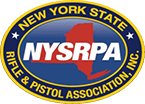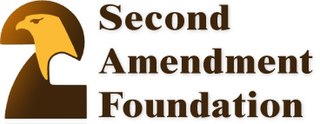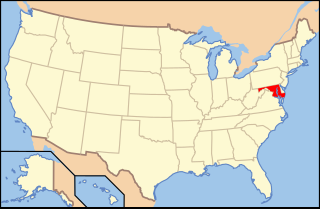
The National Rifle Association of America (NRA) is a gun rights advocacy group based in the United States. Founded in 1871 to advance rifle marksmanship, the modern NRA has become a prominent gun rights lobbying organization while continuing to teach firearm safety and competency. The organization also publishes several magazines and sponsors competitive marksmanship events. According to the NRA, it had nearly 5 million members as of December 2018, though that figure has not been independently confirmed.
Tinker v. Des Moines Independent Community School District, 393 U.S. 503 (1969), was a landmark decision by the United States Supreme Court that recognized the First Amendment rights of students in U.S. public schools. The Tinker test, also known as the "substantial disruption" test, is still used by courts today to determine whether a school's interest to prevent disruption infringes upon students' First Amendment rights. The Court famously opined, "It can hardly be argued that either students or teachers shed their constitutional rights to freedom of speech or expression at the schoolhouse gate."
Gun laws in the United States regulate the sale, possession, and use of firearms and ammunition. State laws vary considerably, and are independent of existing federal firearms laws, although they are sometimes broader or more limited in scope than the federal laws.
Charles J. "Chuck" Cooper is an appellate attorney and litigator in Washington, D.C., where he is a founding member and chairman of the law firm Cooper & Kirk, PLLC. He was named by The National Law Journal as one of the 10 best civil litigators in Washington. The New York Times described him as "one of Washington’s best-known lawyers." He has represented prominent American political figures, including Attorney General Jeff Sessions, in response to the alleged Russian interference in the 2016 United States elections; Attorney General John Ashcroft; and former National Security Adviser and United States Ambassador to the United Nations John Bolton.

The New York State Rifle & Pistol Association (NYSRPA) is the U.S. state of New York's largest and oldest firearms advocacy organization. Established in 1871, the NYSRPA is dedicated to the preservation of gun rights, firearm safety and education, and shooting sports. It is associated with the National Rifle Association of America ("NRA") and engages locally in many activities similar to the NRA.

The Second Amendment Foundation (SAF) is a United States nonprofit organization that supports gun rights. Founded in 1974 by Alan Gottlieb and headquartered in Bellevue, Washington, SAF publishes gun rights magazines and public education materials, funds conferences, provides media contacts, and has assumed a central role in sponsoring lawsuits.
District of Columbia v. Heller, 554 U.S. 570 (2008), is a landmark decision of the Supreme Court of the United States. It ruled that the Second Amendment to the U.S. Constitution protects an individual's right to keep and bear arms—unconnected with service in a militia—for traditionally lawful purposes such as self-defense within the home, and that the District of Columbia's handgun ban and requirement that lawfully owned rifles and shotguns be kept "unloaded and disassembled or bound by a trigger lock" violated this guarantee. It also stated that the right to bear arms is not unlimited and that certain restrictions on guns and gun ownership were permissible. It was the first Supreme Court case to decide whether the Second Amendment protects an individual right to keep and bear arms for self-defense or whether the right was only intended for state militias.

Roger Thomas Benitez is a senior United States district judge of the U.S. District Court for the Southern District of California. He is known for his rulings striking down several California gun control laws.
United States v. Stevens, 559 U.S. 460 (2010), was a decision by the Supreme Court of the United States, which ruled that 18 U.S.C. § 48, a federal statute criminalizing the commercial production, sale, or possession of depictions of cruelty to animals, was an unconstitutional abridgment of the First Amendment right to freedom of speech.
McDonald v. City of Chicago, 561 U.S. 742 (2010), was a landmark decision of the Supreme Court of the United States that found that the right of an individual to "keep and bear arms", as protected under the Second Amendment, is incorporated by the Fourteenth Amendment and is thereby enforceable against the states. The decision cleared up the uncertainty left in the wake of District of Columbia v. Heller (2008) as to the scope of gun rights in regard to the states.
Arizona Free Enterprise Club's Freedom Club PAC v. Bennett, 564 U.S. 721 (2011), is a decision by the Supreme Court of the United States.
Arizonans for Official English v. Arizona, 520 U.S. 43 (1996), was a United States Supreme Court decision that held that Article III required standing for each stage of litigation, rather than just when a complaint is filed.
Snyder v. Phelps, 562 U.S. 443 (2011), is a landmark decision by the Supreme Court of the United States in which the Court held that speech made in a public place on a matter of public concern cannot be the basis of liability for a tort of emotional distress, even if the speech is viewed as offensive or outrageous.

Gun laws in Maryland regulate the sale, possession, and use of firearms and ammunition in the U.S. state of Maryland.

Peruta v. San Diego, 824 F.3d 919, was a decision of the United States Court of Appeals for the Ninth Circuit pertaining to the legality of San Diego County's restrictive policy regarding requiring documentation of "good cause" that "distinguish[es] the applicant from the mainstream and places the applicant in harm's way" before issuing a concealed carry permit.

The 2016 Proposition 63, titled Firearms and Ammunition Sales, is a California ballot proposition that passed on the November 8, 2016 ballot. It requires a background check and California Department of Justice authorization to purchase ammunition, prohibits possession of high-capacity ammunition magazines over ten rounds, levies fines for failing to report when guns are stolen or lost, establishes procedures for enforcing laws prohibiting firearm possession by specified persons, and requires California Department of Justice's participation in the federal National Instant Criminal Background Check System.
National Institute of Family and Life Advocates v. Becerra, 585 U.S. 755 (2018), was a case before the Supreme Court of the United States addressing the constitutionality of California's FACT Act, which mandated that crisis pregnancy centers provide certain disclosures about state services. The law required that licensed centers post visible notices that other options for pregnancy, including abortion, are available from state-sponsored clinics. It also mandated that unlicensed centers post notice of their unlicensed status. The centers, typically run by Christian non-profit groups, challenged the act on the basis that it violated their free speech. After prior reviews in lower courts, the case was brought to the Supreme Court, asking "Whether the disclosures required by the California Reproductive FACT Act violate the protections set forth in the free speech clause of the First Amendment, applicable to the states through the Fourteenth Amendment."
New York State Rifle & Pistol Association, Inc. v. City of New York, New York, 590 U.S. ___ (2020), abbreviated NYSRPA v. NYC and also known as NYSRPA I to distinguish it from the subsequent case, was a case addressing whether the gun ownership laws of New York City, which restrict the transport of a licensed firearm out of one's home, violated the Second Amendment to the United States Constitution, the U.S. Constitution's Commerce Clause, and the right to travel. It was the first major gun-related case that the Supreme Court had accepted for review in nearly ten years, after District of Columbia v. Heller (2008) and McDonald v. City of Chicago (2010). After the Supreme Court agreed to hear the case, New York City and New York state amended its laws to allay the challenged provision. In a per curiam decision in April 2020, the Supreme Court determined that the case was moot, vacating and remanding the case to lower courts to determine "whether petitioners may still add a claim for damages in this lawsuit with respect to New York City's old rule".
New York State Rifle & Pistol Association, Inc. v. Bruen, 597 U.S. 1 (2022), abbreviated NYSRPA v. Bruen and also known as NYSRPA II or Bruen to distinguish it from the 2020 case, is a landmark decision of the United States Supreme Court related to the Second Amendment to the United States Constitution. The case concerned the constitutionality of the 1911 Sullivan Act, a New York State law requiring applicants for a pistol concealed carry license to show "proper cause", or a special need distinguishable from that of the general public, in their application.
Houston Community College System v. Wilson, 595 U.S. ___ (2022), is a United States Supreme Court case involving the First Amendment to the United States Constitution. The unanimous Court held that a local government board member's freedom of speech was not abridged when he was verbally censured by his colleagues.







